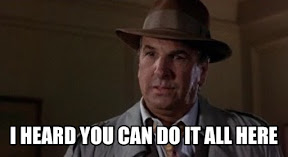Whereas most big Hollywood stars were created by the Hollywood machine itself, the Marx Brothers were already legends before they went out west to star in pictures. The Marx Brothers had already made a name for themselves in vaudeville and Broadway, having been encouraged from a young age by their parents to undertake artistic pursuits. They initially began as a serious act, performing music in opera houses. The brothers were extremely talented musicians who took their craft seriously. After Groucho improvised jokes onstage during an interruption by an audience member, the family decided to change their act to comedy, honing their legendary act on stages around the country.

Soon Hollywood came calling, hiring the brothers to translate their skills to films. Paramount was not the biggest studio around, but it was willing to allow the guys to film in New York and pretty much do whatever they wanted within reason. The brothers became a phenomenon, capturing the attention of MGM, the largest movie studio at the time. MGM went all out to attract the guys, promising just about everything except for full creative control. Since, as the saying goes, Chico needed the money, the brothers moved to MGM. Though they liked working with MGM executive Irving Thalberg, they weren't too enamored with MGM's factory filmmaking process.
At MGM, it wasn't the talent that was king, but Louis B. Mayer. Actors were expected to do whatever they were told, the way they were told to do it. In the Paramount films, there was usually a snippet of a plot which just served as a vehicle to let the brothers do their schtick. At MGM, however, more importance was given to the co-stars and the B plot. Did anyone really care about the society matron that the brothers would inevitably offend or the young lovers who would eventually come together at the end of the film? MGM seemed to think so. When Irving Thalberg, who had been the biggest advocate for the Marx Brothers at MGM, passed away, the brothers left MGM for RKO, only to eventually return to MGM for three more films. They would mostly consider themselves retired until Chico persuaded them to make a two film return at United Artists. It turned out that Chico really needed the money.
While some of their biggest fans felt that the brothers were too restrained by MGM's strict system, Groucho himself felt that the Thalberg MGM pictures were the best of their films. Regardless, it is definitely easy to see the difference between the anarchic mania of the Paramount films and the more controlled factory polish of the MGM pictures.


















































